1. Oxford English Dictionary
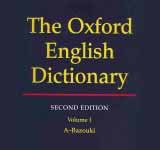
The Oxford English Dictionary (abbreviated OED) is a dictionary published by the Oxford University Press, considered the most scholarly and complete dictionary of the English language, as well as the main point of reference for its etymological study. In the same way, it gives rise to a complete and defined explanation of its syntax and its same grammar as of November 30, 2005, it includes some 301,000 main entries, through 350 million characters. In addition to the main entries, it contains 157,000 combinations and derivatives in bold and 169,000 phrases and combinations in bold italic, for a total of 616,500 expressions. There are 137,000 pronunciations, 249,000 etymologies, 577,000 cross-references, and 2,412,400 illustrative citations. The intention of the work is to collect all the known uses and variants of each word in all varieties of English from around the world, past and present, as well as their etymologies, history, pronunciation, etc. It is the starting point for many studies on the English language, and the order in which the different spellings of words are listed there has a great influence on the written English of many countries.
2. Longman Dictionary of Contemporary English
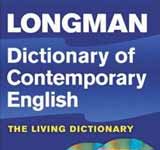
Longman Dictionary of Contemporary English (short: LDOCE) is an English dictionary and has been published by Longman since 1978. The dictionary can be purchased on paper or online. The LDOCE is an advanced learner's dictionary, i.e. a dictionary that is suitable for people who have at least a B2 level command of the English language. The specialty of the Longman dictionaries is that the definitions of the searched words are explained as simply as possible in order to make it easier for non-native speakers to understand the words, which is why the LDOCE is particularly suitable for speakers whose mother tongue is not English. In Germany, Longman's dictionaries are published in cooperation with the German publisher Langenscheidt. The Longman Dictionary is also used in Chinese Longman schools.
3. A Dictionary of the English Language
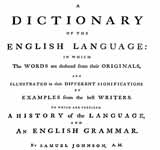
A Dictionary of the English Language is a dictionary of the English language written in 1755 by the British writer and lexicographer Samuel Johnson. It was and is seen as an authoritative dictionary and an important contribution to the description and standardization of the language. It is also known as Johnson's Dictionary. Contrary to what is claimed, Johnson's work was not the first dictionary of English. However, the earlier works were generally bilingual dictionaries, sometimes cluttered and poorly organized, or merely glossaries of 'difficult words'. Due to the strong spread of printed works in the eighteenth century in the form of literary and scientific writings, pamphlets and newspapers and the increased appetite for reading of the public, the need arose for some form of ordering of the language in terms of spelling, grammar and definition of concepts. The scope and breadth of the dictionary is reflected in its comprehensive full title, which reads: A Dictionary of the English Language: In Which the Words are Deduced from their Originals, and Illustrated in their Different Significations by Examples from the Best Writers. To Which are Prefixed A History of the Language, and an English Grammar.
4. The American Heritage Dictionary of the English Language
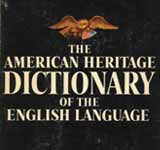
The American Heritage Dictionary of the English Language (AHD) is an American dictionary of the English language published by the Boston publishing house Houghton Mifflin, whose first edition appeared in 1969. James Parton, owner of the historic newspaper American Heritage, was dissatisfied with the excessive permissiveness of the Webster's Third, published in 1961, and tried to buy the company G. and C. Merriam to make changes. When that failed, he contracted with Houghton to publish a new dictionary. The AHD was published by William Morris and was based on a user staff of 105 writers, speakers and prominent people selected for their well-known conservatism in the use of the language. However, Morris made unfounded use of the lexicographers, often ignoring their warnings and inserting his own opinions.
5. Macmillan Dictionary
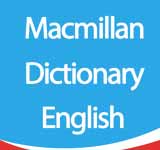
Macmillan English Dictionary for Advanced Learners or Macmillan English Dictionary of Advanced Education or also known as the Medal Dictionary. First published in 2002 by Macmillan Education, the Medal Dictionary is defined as an advanced education dictionary that shares most of the features and characteristics of this type of dictionary. The dictionary provides simple language definitions, using carefully selected vocabulary. Most of the dictionary vocabulary includes sentences to explain how the vocabulary is used and to ensure knowledge of the meaning. Information is provided on how to overlap vocabulary grammatically and linguistically.
6. Collins English Dictionary
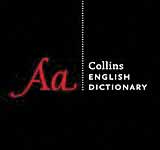
The Collins English Dictionary is a English dictionary available printed and online. It is published by HarperCollins in Glasgow. The 1979 edition of the dictionary, with Patrick Hanks as editor and Lawrence Urdang as editorial director, was the first British dictionary to use the full power of computer databases and typographic composition in its preparation. This meant that, for example, physical editors could control separate definitions of the same word and the results could be mixed into the final meaning, rather than an editor being responsible for a word. The current one is the 13th edition, published in November 2018. Previously, new editions were published once every three or four years. The full edition of the Collins English Dictionary was published on the Internet on December 31, 2011 on the CollinsDictionary.com website, together with the full editions of dictionaries in French, German, Spanish and Italian. The site also includes examples of statements showing the use of the word frequency in Collins Bank of Corpus Inglês (an institution database), trends through the project Ngrams of Google and illustrative images Flickr.
7. Random House Dictionary of the English Language
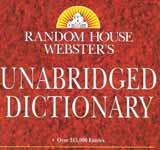
Random House Webster's Unabridged Dictionary is a American dictionary, published in 1966 as The Random House Dictionary of the English Language: The Unabridged Edition. Edited by Jess Stein, it contained 315,000 entries in 2256 pages, as well as 2400 illustrations.
8. Chambers Dictionary
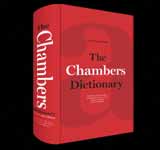
The Chambers Dictionary is a reference dictionary for the English language. Its tenth edition was published in 2006 by Chambers Harrap Publishers. Its two original authors and publishers were Scots, the brothers William (1800-1883) and Robert Chambers (1802-1871), the latter being a famous naturalist. Both had an extra finger on each hand. They lived in Peebles, a small town in the Scottish Borders. From 1901 the dictionary was titled Chambers's Twentieth Century Dictionary. Today it is called the Chambers Twenty-First Century Dictionary. The first edition has 10 volumes and is published from 1860 to 1868), in Edinburgh. The second edition, published in 520 weekly fascicules between 1888 and 1892, forms a bound set of ten volumes comprising approximately 8,300 pages, 85,000 entries and some 10 million words. It mobilized 200 contributors. This edition has a lot of data about the United States. The Chambers is the English dictionary with the most words in one volume. It contains more dialectical, archaic or unexpected terms than its competitors. Gladly used by lovers of crosswords or Scrabble, it is known to offer, here and there, some humorous definitions. A "flash", according to Chambers, is a "pastry of long form but of short duration", while "middle age" is "between youth and old age" variable depending on the person making the estimate. It is assumed that these definitions were originally introduced by facetious lexicographers. At one point, they were deleted by the publisher.
9. Concise Oxford English Dictionary
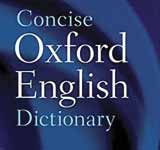
The Concise Oxford English Dictionary (titled The Concise Oxford Dictionary until 2002, and also known by the abbreviation COD) is probably the best known of the "small" Oxford dictionaries. It is used by the United Nations and NATO as the spelling authority in documents drafted in English. It was launched as a derivative of the Oxford English Dictionary (OED), although the SZ part had to be written before the Oxford English Dictionary reached this stage. Since the tenth edition, it has been based on the Oxford Dictionary of English. The latest edition of the Concise Oxford English Dictionary contains over 240,000 entries and 1,681 pages (only concise compared to its parent OED of over 21,000 pages). The eleventh edition is also available as an eBook version.
10. Century Dictionary
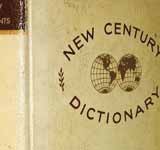
The Century Dictionary and Cyclopedia is one of the largest encyclopedic dictionaries in the English language. The first edition was published from 1889 to 1891 by The Century Company of New York, in six, eight or ten volumes (originally published in 24 fascicles) in 7,046 pages with some 10,000 woodcut illustrations. It was edited by William Dwight Whitney, linguist and Sanskrit scholar, with the help of Benjamin Eli Smith (in). It was a great expansion of the small Imperial A Dictionary of the English Language, based on the 1841 edition of the American Dictionary of Noah Webster. After Whitney's death in 1894, additional volumes were published under Smith's supervision, including The Century Cyclopedia of Names (1894) and The Century Atlas (1897). A two-volume Supplement to New Vocabulary, published in 1909, completes the dictionary. A reformatted edition, The Century Dictionary and Cyclopedia, was published in 1911 in twelve volumes of twelve quarto: ten vocabulary, plus the volume of names and atlas. This set has been the subject of several prints, the last in 1914. In the same year, the ten volumes of vocabulary were published in one giant volume, approximately 8,500 pages in very fine paper.
11. Oxford Dictionary of English
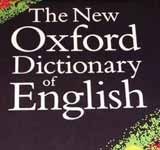
The Oxford Dictionary of English formerly "The New Oxford Dictionary of English" (NODE), is a single volume dictionary of English, first published in 1998 by Oxford University Press. This dictionary is not based on the Oxford English Dictionary and should not be mistaken for a new or updated version of the OED. It is a completely new dictionary, which strives to represent as closely as possible the current use of English words. The 2005 edition contained 355,000 words, phrases, and definitions, including biographical references and thousands of encyclopedic entries. A third edition was published in August 2010, with some new words added, including "vuvuzela". It is currently the largest single volume English dictionary published by Oxford University Press. The first editor, Judy Pearsall, wrote in the introduction that it is based on a modern understanding of the language and derives from a contemporary English linguistic corpus. For example, the editors did not discourage split infinitives, but instead justified their use in some contexts. The dictionary is based on the bodies of texts such as the British National Corpus and the citation database of the University of Oxford Oxford Reading Program.
12. The American College Dictionary
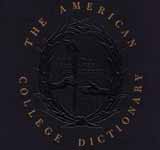
The American College Dictionary was the first dictionary published by Random House and was later expanded to create the Random House Dictionary of the English Language. Many researchers participated in the development of the dictionary with more than 300 specialists.
13. Black's Law Dictionary
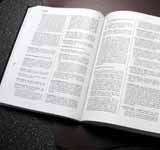
Black's Law Dictionary is a law dictionary for United States law. It was founded by Henry Campbell Black. He has been cited as an authority on law in several cases of the United States Supreme Court. The latest editions, including the "abridged" and pocket editions, are useful starting points for lawyers and law students in dealing with underused legal words. It is the preferred and most authoritative choice to cite, both in legal reports and in US court decisions. The first edition was published in 1891 and the second in 1910, long before the first edition of the Oxford English Dictionary was completed in 1928. The sixth - and other earlier editions of the dictionary - also provide references to jurisprudential cases related to the cited term, which some attorneys see as their great added value, providing a useful starting point with important cases. The Internet made legal research much easier than before it was created, so many cases of specific states - or circuits - were omitted from the seventh edition in 1999. The eighth edition introduced a unique system of perpetually up-to-date cases and cross-references to other legal encyclopedias.
14. Brewer's Dictionary of Phrase and Fable
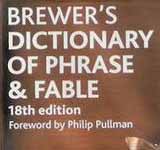
The Brewer's Dictionary of Phrase and Fable, which is often abbreviated simply Brewer's is a reference book in English with definitions and explanations of many famous phrases, historical or mythical. This dictionary was first published in 1870 by Reverend Ebenezer Cobham Brewer. The work is currently in its 19th edition, published in 2012.
15. Canadian Oxford Dictionary
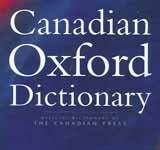
Canadian Oxford Dictionary (abbreviated CanOD) is a dictionary of Canadian English published by Oxford University Press in Canada in 1998, which quickly became the standard reference dictionary of Canadian English. Until September 2008, Oxford maintained a permanent staff of lexicographers in Canada, led by Editor Katherine Barber, as editor-in-chief. After the division was closed, Oxford outsourced freelance editors to help make the dictionary. The second edition contains 300,000 entries, including some 2,200 true Canadianisms. It also provides information on Canadian pronunciation and spelling, which has British and American spelling characteristics. The updated second edition was published in 2004. It is used by most major Canadian newspapers, publishing houses, and the Canadian government. The influential The Canadian Press Stylebook follows the Canadian Oxford Dictionary. After its publication in 1998, the dictionary was a publisher success, remaining on the Canadian bestseller lists for more than a year, quite unusual for a reference book. In 1999, it was awarded the Libris Award, awarded by the Canadian Booksellers Association, as the best book of the year in the categories of "non-fiction books" and "specialty books".
16. Macquarie Dictionary
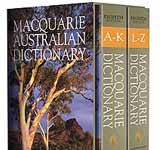
The Macquarie Dictionary is a dictionary for Australian English. The dictionary is the authoritative source for Australian English. It also pays great attention to New Zealand English. Originally it was a publishing project by Jacaranda Press, an educational publisher from Brisbane, for which an editorial committee was formed, which mainly consisted of the linguistic department of Macquarie University in Sydney. It is now being used by Macquarie Dictionary Publishers in a publishing project by Pan Macmillan Australia Pty Ltd. released In October 2007, the publisher moved its editorial from Macquarie University to Sydney University and later to the Pan Macmillan offices in Sydney's central business district. The first seven editions of the Macquarie Dictionary were edited by lexicographer Susan Butler, who joined the project as a research fellow in 1970 and was its editor-in-chief when the first edition was published in 1981. Butler announced her resignation as editor of the Macquarie Dictionary in March 2018 after serving the publisher for 48 years.

